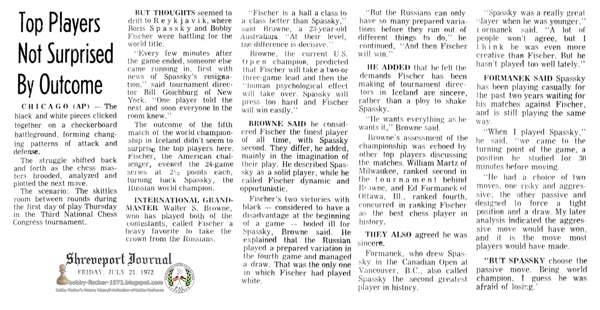The Shreveport Journal Shreveport, Louisiana Friday, July 21, 1972 - Page 18
Top Players Not Surprised By Outcome
Chicago (AP)—The black and white pieces clicked together on a checkerboard battleground, forming changing patterns of attack and defense.
The struggle shifted back and forth as the chess masters brooded, analyzed and plotted the next move.
The scenario: The skittles room between rounds during the first day of play Thursday in the Third National Chess Congress tournament.
BUT THOUGHTS seemed to drift to Reykjavik, where Boris Spassky and Bobby Fischer were battling for the world title.
“Every few minutes after the game ended, someone else came running in, first with news of Spassky's resignation,” said tournament director Bill Goichburg of New York. “One player told the next and soon everyone in the room knew.”
The outcome of the fifth match of the world championship in Iceland didn't seem to surprise the top players here. Fischer, the American challenger, evened the 24-game series at 2½ points each, turning back Spassky, the Russian world champion.
INTERNATIONAL GRANDMASTER Walter S. Browne, who has played both of the contestants, called Fischer a heavy favorite to take the crown from the Russians.
“Fischer is a half a class to a class better than Spassky,” said Browne, a 23-year-old Australian. “At their level, the difference is decisive.”
Browne, the current U.S. Open champion, predicted that Fischer will take a two-or-three game lead and then the “human psychological effect will take over. Spassky will press too hard and Fischer will win easily.”
BROWNE SAID he considered Fischer the finest player of all time, with Spassky second. They differ, he added, mainly in the imagination of their play. He described Spassky as a solid player, while he called Fischer dynamic and opportunistic.
Fischer's two victories with black—considered to have a disadvantage at the beginning of a game — boded ill for Spassky, Browne said. He explained that the Russian played a prepared variation in the fourth game and managed a draw. That was the only one in which Fischer had played white.
“But the Russians can only have so many prepared variations before they run out of different things to do,” he continued, “And then Fischer will win.”
HE ADDED that he felt the demands Fischer has been making of tournament directors in Iceland are sincere, rather than a ploy to shake Spassky.
“He wants everything as he wants it,” Browne said.
Browne's assessment of the championship was echoed by other top players discussing the matches. William Martz of Milwaukee, ranked second in the tournament behind Brown, and Ed Formanek of Ottawa, Illinois, ranked fourth, concurred in ranking Fischer as the best chess player in history.
THEY ALSO agreed he was sincere.
Formanek, who drew Spassky in the Canadian Open at Vancouver, B.C., also called Spassky the second greatest player in history.
“Spassky was a really great player when he was younger,” Formanek said. “A lot of people won't agree, but I think he was even more creative than Fischer. But he hasn't played too well lately.”
FORMANEK SAID Spassky has been playing casually for the past two years waiting for his matches against Fischer, and is still playing the same way.
“When I played Spassky,” he said, “we came to the turning point of the game, a position he studied for 30 minutes before moving.
“He had a choice of two moves, one risky and aggressive; the other passive and designed to force a tight position and a draw. My later analysis indicated the aggressive move would have won, and it is the move most players would have made.
“BUT SPASSKY chose the passive move. Being world champion, I guess he was afraid of losing.”

























